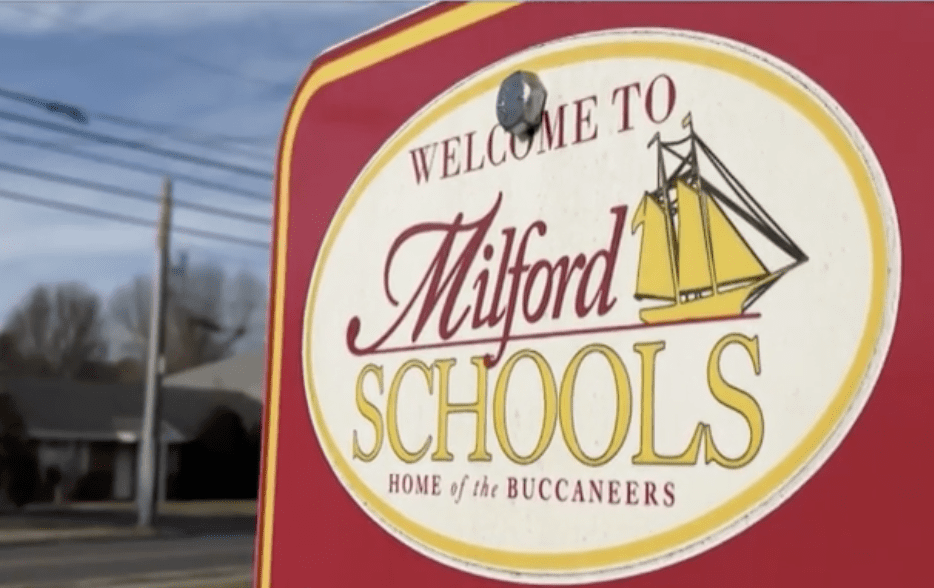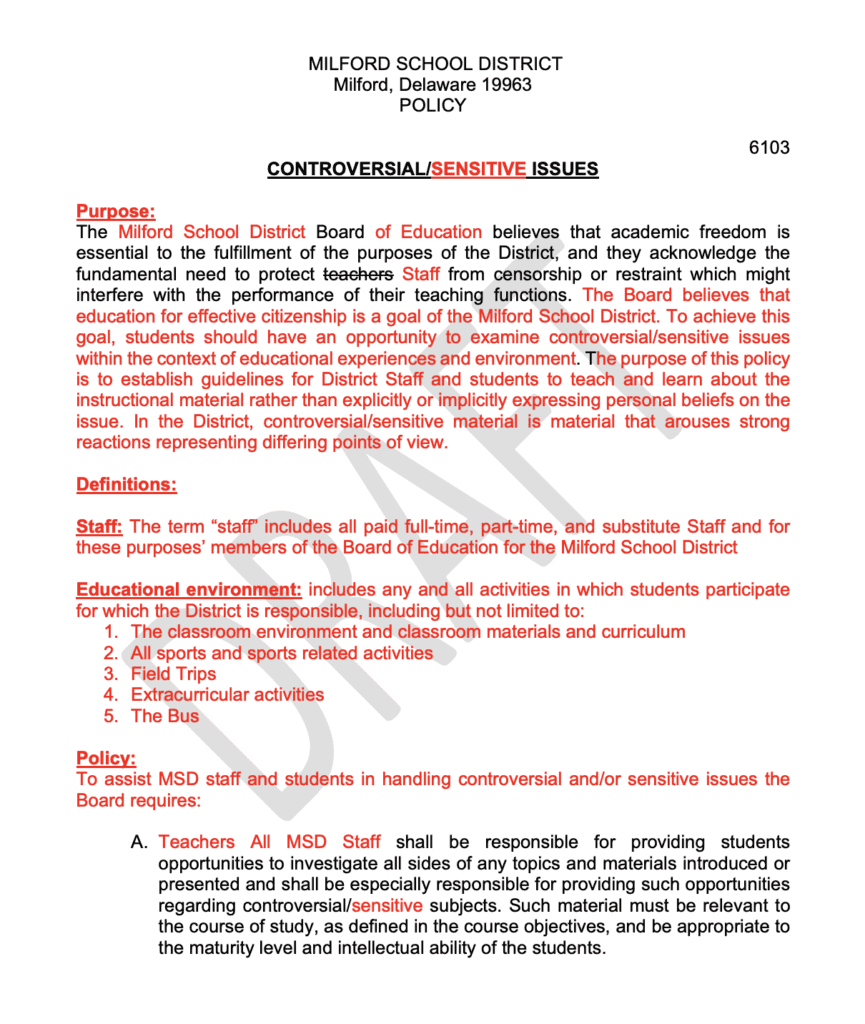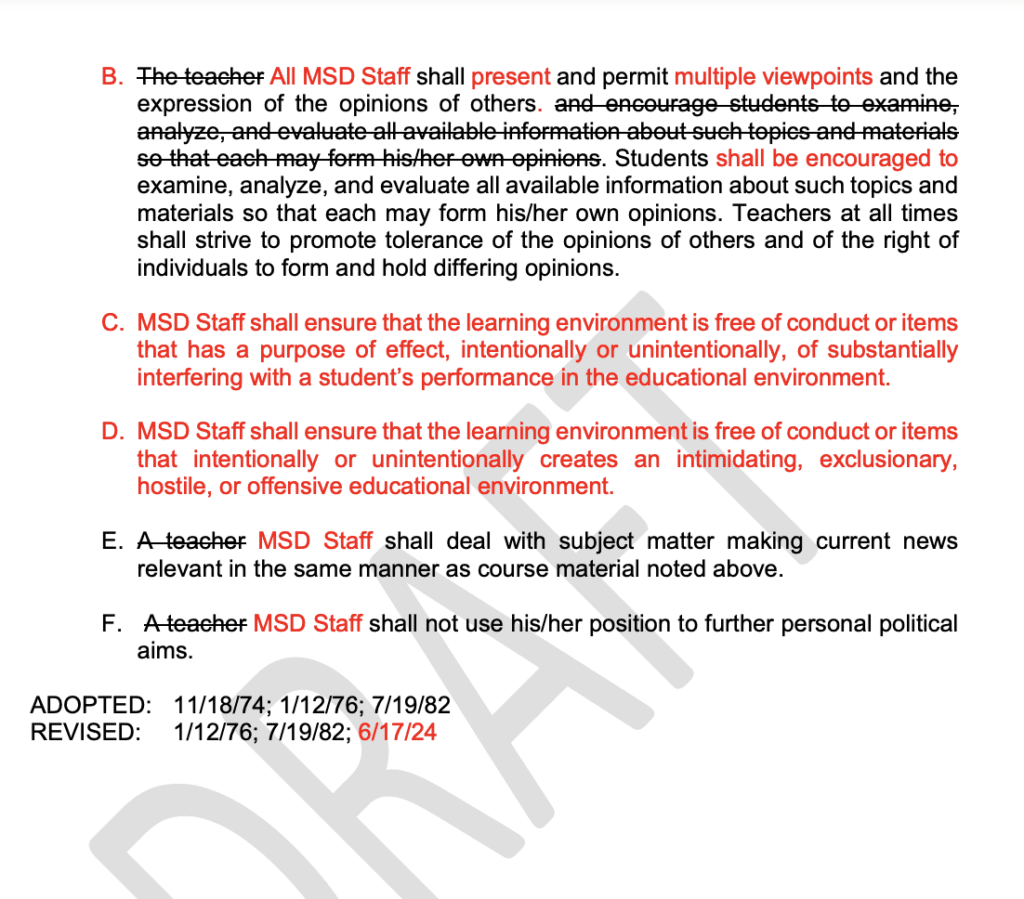
Milford School District’s policy on controversial/sensitive issues has not changed for decades, and a proposed change has faced a lot of opposition.
A controversial Milford School Board policy change about the learning environment will be kicked down the road for a July vote after it was opposed by students, community members and even the ACLU.
Board Policy 6103, which proposes new standards with controversial and sensitive Issues, was tabled by the district’s board of education Monday night. That means it wasn’t voted on and is expected to be at the board’s next meeting on July 15.
Originally adopted in 1974, Board Policy 6103 has not been updated since 1982.
Some of the key additions Milford’s considering include:
- Milford School District staff shall ensure that the learning environment is free of conduct or items that have a purpose of effect, intentionally or unintentionally, of substantially interfering with a student’s performance in the educational environment.
- Milford School District staff shall ensure that the learning environment is free of conduct or items that intentionally or unintentionally creates an intimidating, exclusionary, hostile or offensive educational environment.
The policy originally applied to teachers, but would expand to all employees in the district if implemented.
“Students examine, analyze, and evaluate all available information about such topics and materials so that each may form his/her own opinions,” would be amended to “students shall be encouraged to” do all of those things.
While the ACLU of Delaware did not have any representatives at Monday’s board meeting, it released a statement urging the district to “abandon the policy that threatens free speech.”
The nonprofit’s gripe is encapsulated by three issues: the policy is overbroad and vague, the policy requires staff members to present certain ideas and the policy is redundant.
The ACLU cites the definition of controversial/sensitive material which is “material that arouses strong reactions representing differing points of view.”
“That will be difficult to implement without engaging in unconstitutional viewpoint
discrimination of certain speech,” the ACLU stated. “The prohibition against items which may cause others offense could also endanger students’ constitutionally protected right to express themselves.”
Michael McCain, a parent in Milford, agreed with this notion.
“There are a lot of topics that should be taught, yet could fall as a violation of this policy, and leaving it up to interpretation could remove certain aspects of free speech,” he said during the public comment part of the meeting. “I urge the school board to revisit, to revise this policy to include specifics of what the offensive term entails, who it’s determined up to and and what exactly it means. Without these changes, it could become a nightmare to enforce.”
Darren Rainey, an educator in Delaware, agreed with the ACLU that the policy is too vague.
He said this presents opportunities that allow anyone to challenge any idea, topic or curriculum that they may deem offensive.
“I have particular concerns over who gets to decide what is deemed offensive, what are the ramifications of an offense under this policy,” he said, “and I would urge this board to really reconsider this policy, particularly involving students, staff, school leadership, alumni, in the drafting policy that meets the needs of students and allows teachers to do their jobs as effectively as possible.”
A female student at Milford High School said a lot of historical topics are very controversial.
She pointed to the Holocaust, and explained how in her school environment, she’s heard a ton of anti-semetic jokes about the tragic event.
The student, who is a member of the LGBTQ community, said that group has been persecuted throughout history just for who they are.
“But the thing is, I feel like people can say ‘Oh, this is offensive to me,’ when a bunch of other people don’t think it’s offensive, and I feel like [the policy] will make it a really messy system,” she said.
There were about a half dozen educators who also shared the idea that differing viewpoints is crucial to a healthy education system, and how the classroom serves as a space for unique perspectives.
“The origin of how this all kind of got started was based on a specific issue that was raised by a parent and their children,” said Adam Brownstein, a board member. “Because I do not have clearance from that individual to disclose the entire situation. I’m working on getting that clearance or that permission.”
He’s working on amending the proposed policy change.
“We live in a very divisive society right now… this policy attempts to temper that polarization by ensuring that staff and students can continue to discuss controversial and/or sensitive issues without the concern for censorship,” he said. “We want to elevate all students and help them to think critically, which often involves allowing them the opportunity to be presented with alternative points of view, and then allowing them to reason for themselves.”
Tuesday morning, Board Vice President Matt Bucher said the reason for tabling the vote on the policy is because he believes the board has the responsibility to consider, in a thoughtful manner, board policy changes, without regard to any timeline.
“There is no particular hurry,” he said. “There’s no reason to vote on any policy the district administration brings to us until we’re satisfied with the final product, and that product moves the district forward in a positive direction.”
Read the full policy proposal here:

Raised in Doylestown, Pennsylvania, Jarek earned a B.A. in journalism and a B.A. in political science from Temple University in 2021. After running CNN’s Michael Smerconish’s YouTube channel, Jarek became a reporter for the Bucks County Herald before joining Delaware LIVE News.
Jarek can be reached by email at [email protected] or by phone at (215) 450-9982. Follow him on Twitter @jarekrutz
Share this Post






